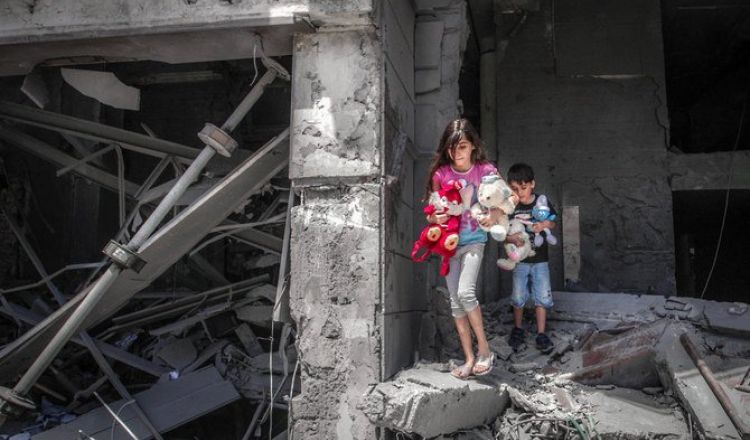7 Points on Ethical and Professional Journalistic Principles in Covering Israel’s War on Gaza
2021-05-18 10:18

The Palestinian BDS National Committee (BNC) and the Palestinian Journalists' Syndicate (PJS) statement on ethical and professional journalistic principles in covering Israel’s war on Gaza.
As part of its ongoing war on two million Palestinians in the occupied and besieged Gaza Strip, on 15 May 2021, the Israeli air force destroyed an “11-storey building in Gaza City housing some 60 residential apartments and a number of offices, including those of Al Jazeera Media Network and The Associated Press,” after giving a one-hour warning to its residents to evacuate it.
Israeli military officials claimed that Palestinian resistance officials had taken offices in this building, a propaganda claim refuted by AP.
Regardless of Israel’s spin, and the fact that Israel’s attacks on journalists are routine and systematic, this latest Israeli attack in Gaza, like many others, amounts to collective punishment, a war crime under international law. Mainstream media coverage of the Israeli assault on Gaza to date shares part of the responsibility for allowing this crime to take place.
Coverage of the entire Israeli assault has largely been framed as a “retaliation” to acts committed by Palestinian resistance groups. This places resistance as the first instance of “violence,” ignoring the basic ethical principle that in a situation of oppression, it is precisely oppression that is the root cause of violence. This framing, coupled with the pervasive and uncritical repetition of Israeli euphemisms and unsubstantiated propaganda claims, has contributed considerably to sanitising, whitewashing, even justifying, Israeli crimes and entrenching its impunity and lack of accountability in accordance with international law.
Israel’s propaganda claims and terminology, after all, have successfully occupied a central position in mainstream coverage given the unparalleled access Israeli military spokespersons and politicians have been afforded by media outlets. To exacerbate this process, many Western journalists, not to mention editors, have betrayed basic principles of journalistic ethics by providing an open, uncritical and unchallenging platform to suspected Israeli war criminals to relentlessly repeat their dehumanisation of Palestinians, reducing whole civilian populations to a particular resistance group, and to their incitement to further racial violence against us.
This is the context that has allowed the Israeli occupation forces to have the audacity and impunity not just to level to the ground the building housing AP, Aljazeera and tens of Palestinian homes live on TV, but to escape proper consequences for many similar, or much worse, war crimes perpetrated against Palestinians during this “operation,” all televised live.
While freedom of speech is a right for everyone, including those with offensive views, commitment to truth, challenging propaganda and minimising harm are basic tenets of journalism. Refraining from allowing a media outlet to be used for incitement to violence or promotion of hatred against particular groups based on ethnic, racial, religious or other forms of identity is among the cardinal ethical principles of journalism.
According to largely universal journalistic ethics, the professional obligation to be inclusive of all sides of a debate does not extend to providing a platform to spread lies, incite to racial violence, including by dehumanizing the victims of this violence and thus normalising and justifying the continuation of violence against them. This is particularly true at times of violent hostility, conflict or oppression when such incitement can cost human lives and livelihoods or stoke ethnic cleansing and other war crimes or crimes against humanity, as defined in international law.
Well informed ethical journalists and editors can identify whether certain speech is deliberately intended to dehumanize a particular group as a means to normalise or justify violently targeting it or suppressing the human rights of those belonging to it.
Condemnations and rhetorical calls to undefined “urgent action” do not suffice.
Based on the above, the Palestinian Journalists Syndicate and the Palestinian BDS National Committee, the largest coalition in Palestinian society, call on the international media outlets, journalists and journalists’ unions to:
1) Recommit to the basic principles of journalistic ethics, resisting pressure from Israel and its lobby groups, and challenging biased and dehumanising editorial lines;
2) End all institutional collaborations with Israeli media organisations that are on record promoting the dehumanisation of Palestinians and racial hatred and violence against us;
3) Refuse paid junkets to Israel organised by the Israeli government or lobby groups;
4) Adhere to, and update style guides to commit to, terminology that is grounded in international humanitarian and human rights law and used by the UN or authoritative human rights organisations in describing the context, such as naming Israel’s regime as apartheid (following Human Rights Watch, B’Tselem and Palestinian human rights organizations).
5) Avoid the unprofessional and unethical, whether intentional or inadvertent, repetition of propaganda terminology propagated by the hegemonic/oppressor side;
6) Respect the rights of journalists and media workers to publicly and openly express personal solidarity with the Palestinian cause (outside the scope of their professional coverage), without being penalised.
7) Ensure that voices of those most affected by the situation of oppression or aggression are centered in reporting, instead of providing far more space/time to the dominant oppressors who have the means to bully, intimidate and threaten journalists and media outlets in order to make them toe the line.










